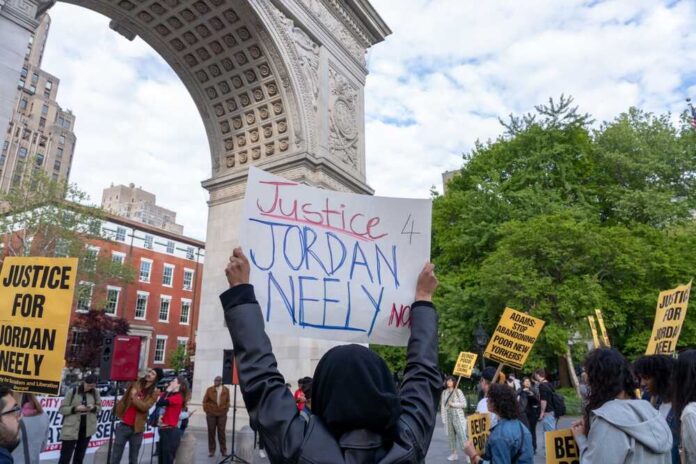
New York City is at the center of escalating controversy following the death of Jordan Neely, a homeless man with mental health issues. Neely died after being restrained in a chokehold by former Marine Daniel Penny, who claims he never intended to harm Neely. As District Attorney Alvin Bragg deliberates on whether to bring charges against Penny, NYC progressives have quickly demanded immediate action, fueling tensions in an already divided city.
The incident began when Neely, who had a history of mental illness, was reportedly yelling and throwing garbage on a subway train. Penny stepped in to restrain him, ultimately resulting in Neely’s death. The city’s medical examiner ruled the death a homicide caused by “compression of neck (chokehold).” Despite the ruling, Penny has not yet been charged with a crime.
NYC subway riders are getting frustrated with protesters interrupting and disrupting their rides #JordanNeely pic.twitter.com/DepIANsmlt
— Rebecca Brannon (@RebsBrannon) May 6, 2023
While some have been cautious about drawing conclusions, others, particularly progressives, have labeled Penny a murderer without considering the complexities surrounding mental health and public safety. For example, Rep. Alexandria Ocasio-Cortez (D-NY) criticized Mayor Eric Adams (D) for not condemning the incident outright, stating that the victim was of a social status some would deem “too low” to care about.
Adams, however, has argued that it is not responsible for city leaders to comment on an ongoing investigation. Instead, he emphasizes the importance of focusing on mental health and providing care for those in need rather than allowing them to languish on the streets and subways.
The Neely case has become a rallying point for many progressives who see it as a symbol of systemic injustice. Public Advocate Jumaane Williams and City Comptroller Brad Lander have joined the call for charges to be filed against Penny “immediately,” further intensifying the debate.
"Bourgeois".
There is a serious and malevolent kink in the thinking of radical elites that would dictate how you should:
FEEL
THINK
BEHAVE
BELIEVE
and any other aspect of your life over which YOU should have personal domain. https://t.co/xG90LEIMr2
— Proud Unrepentant Ultra MAGA Gina Bella (@ginabella) May 8, 2023
However, Neely’s background complicates the narrative. He had been arrested 42 times, including four times for assault. He had an active warrant for allegedly assaulting a 67-year-old woman in 2021. In addition, Neely’s family acknowledges his struggles with mental health issues, including schizophrenia, PTSD, and depression.
As the city waits for DA Bragg’s decision, protests have erupted in New York, with some demonstrators blocking subway service to demand consequences for Penny. The tense situation has raised concerns of escalating violence and unrest reminiscent of the George Floyd protests in 2020.
The situation has sparked a heated debate over the proper response to mental health crises, public safety, and the role of law enforcement. As tensions rise, how the city will navigate this complex and divisive issue remains to be seen.




























